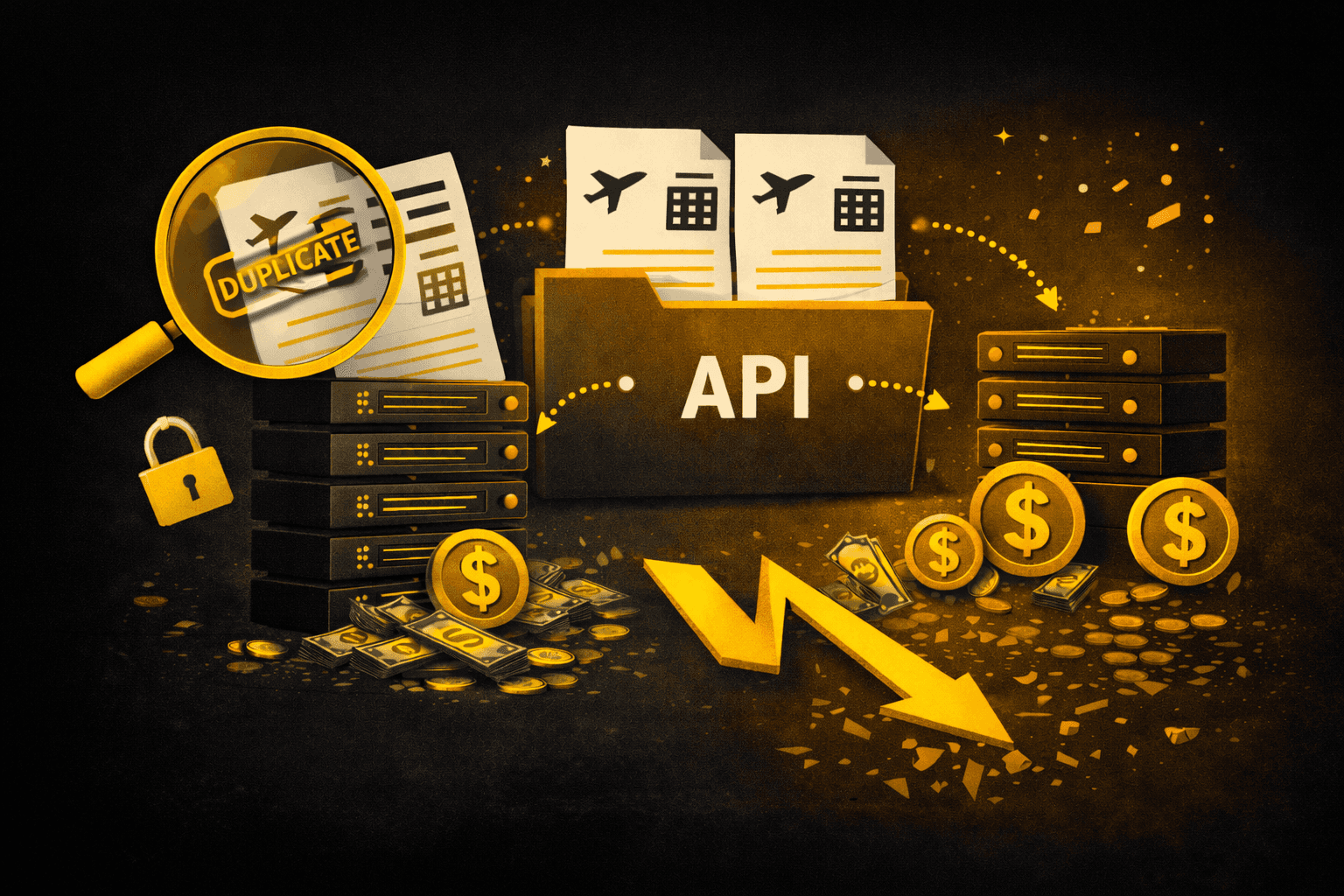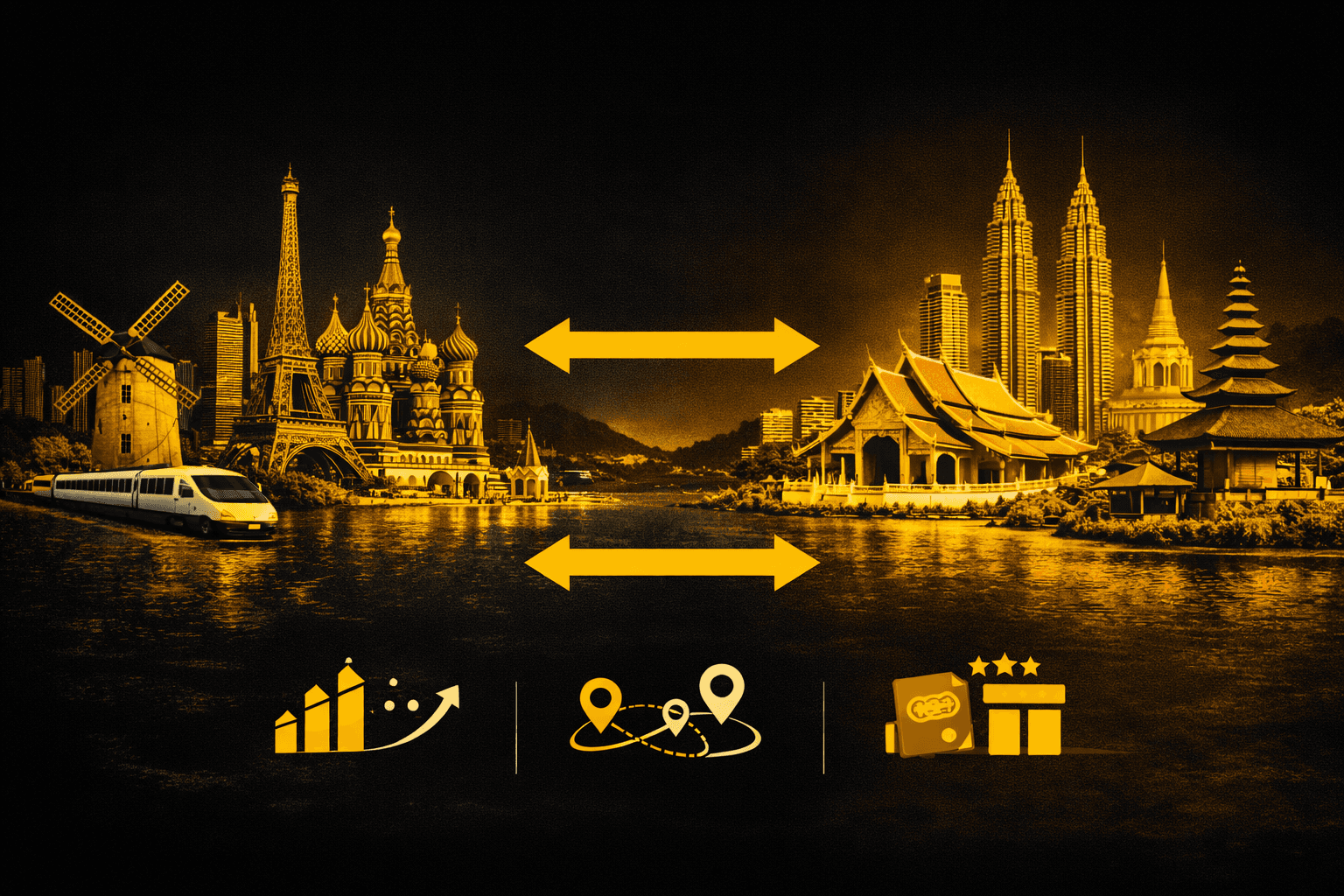Travel Trends 2025: Strategic Imperatives for B2B Travel Companies
The travel industry stands at an inflection point. As we advance through 2025, B2B travel companies face unprecedented opportunities—and challenges—that will determine market leadership for the next decade. This comprehensive analysis examines seven transformative trends reshaping the industry landscape.
Executive Summary
The global travel industry, valued at over $1.4 trillion in 2024, is experiencing rapid transformation driven by technological innovation, evolving corporate priorities, and shifting consumer expectations. Our analysis reveals that companies implementing AI-driven personalization see average conversion increases of 25-40%, while those prioritizing sustainability report 30% higher customer retention rates among millennial and Gen Z travelers.
This report provides actionable insights for B2B travel decision-makers seeking to capitalize on emerging opportunities while mitigating industry disruption risks.
1. AI-Powered Hyper-Personalization: The New Competitive Advantage
The Current Landscape
Artificial Intelligence has evolved from experimental technology to mission-critical infrastructure. By 2025, companies leveraging advanced AI personalization report significantly higher customer lifetime values and reduced acquisition costs.
Market Impact:
Expedia Group: 25% conversion increase through AI-driven recommendations
Booking.com: 15% improvement in customer satisfaction scores
Amadeus: 30% reduction in booking abandonment rates
Implementation Framework
Phase 1: Data Integration
Consolidate customer touchpoints across all channels
Implement real-time behavioral tracking
Establish data governance protocols for privacy compliance
Phase 2: AI Model Development
Deploy machine learning algorithms for preference prediction
Integrate natural language processing for customer service
Implement dynamic pricing optimization
Phase 3: Personalization at Scale
Create individualized travel recommendations
Develop predictive customer service interventions
Launch automated marketing campaign optimization
ROI Projections
Companies implementing comprehensive AI personalization typically see:
20-30% increase in direct booking conversions
15-25% improvement in customer retention
10-20% reduction in customer acquisition costs
Strategic Recommendation: Allocate 15-20% of technology budget to AI initiatives within the next 18 months to maintain competitive positioning.
2. Sustainability: From Corporate Responsibility to Revenue Driver
The Business Case for Green Travel
Sustainability has transformed from a marketing differentiator to a fundamental business requirement. Research indicates that 73% of business travelers consider environmental impact when making booking decisions, with this figure rising to 86% among travelers under 35.
Industry Leaders Setting the Standard
Accor Hotels: Carbon neutrality by 2030, 40% reduction in water consumption
Result: 22% increase in corporate bookings from sustainability-focused companies
Marriott International: $0.5 billion investment in renewable energy
Result: 18% improvement in brand preference among corporate clients
Air France-KLM: 50% reduction in CO2 emissions per passenger-kilometer by 2030
Result: 25% increase in corporate partnership agreements
Implementation Strategy
Immediate Actions (0-6 months):
Conduct comprehensive carbon footprint assessment
Implement waste reduction programs
Partner with certified eco-friendly suppliers
Medium-term Goals (6-18 months):
Achieve third-party sustainability certifications
Launch carbon offset programs for customers
Develop transparent sustainability reporting
Long-term Vision (18+ months):
Integrate renewable energy sources
Establish circular economy practices
Create sustainability-linked revenue streams
Financial Impact: Companies with robust sustainability programs report 12-18% premium pricing power and 25% higher customer retention rates.
3. Bleisure Travel: Capturing the $300 Billion Opportunity
Market Dynamics
The bleisure travel segment represents one of the fastest-growing opportunities in business travel, with market size projected to reach $300 billion by 2026. This trend reflects fundamental shifts in work-life integration and employee value propositions.
Success Stories and Strategies
Hilton Worldwide:
Launched "Work from Hilton" program
35% increase in extended stays
Average revenue per guest increase of 28%
American Express Global Business Travel:
Developed integrated bleisure booking platform
40% growth in multi-day corporate bookings
Client satisfaction scores improved by 22%
Revenue Optimization Framework
Product Development:
Create flexible itinerary packages
Develop family-friendly corporate accommodations
Offer weekend extension incentives
Technology Integration:
Build seamless expense management systems
Implement approval workflows for extended stays
Create mobile-first booking experiences
Partnership Strategy:
Collaborate with local experience providers
Establish corporate rates for leisure activities
Develop loyalty program crossover benefits
Expected Outcomes: Companies successfully capturing bleisure demand report 20-35% increases in booking values and 15% improvements in customer lifetime value.
4. Frictionless Digital Experiences: The New Standard
Technology Infrastructure Requirements
Digital transformation in travel extends beyond basic online booking to encompass the entire customer journey. Leading companies invest 12-15% of revenue in digital infrastructure to maintain competitive advantage.
Innovation Benchmarks
Singapore Changi Airport:
Fully automated check-in and boarding processes
45% reduction in passenger processing time
92% customer satisfaction rating for digital services
Delta Air Lines:
Biometric boarding at 35+ airports
25% improvement in on-time departures
$50 million annual operational cost savings
Digital Transformation Roadmap
Foundation Layer:
Cloud-based infrastructure migration
API-first architecture implementation
Real-time data synchronization across platforms
Experience Layer:
Mobile-optimized interfaces
Contactless payment integration
Predictive service delivery
Intelligence Layer:
IoT sensor integration
Automated customer service
Predictive maintenance systems
Investment Framework: Allocate 8-12% of annual revenue to digital transformation initiatives, with expected ROI of 200-300% within 24 months.
5. Corporate Travel Evolution: Adapting to New Realities
Shifting Corporate Priorities
Post-pandemic corporate travel emphasizes duty of care, flexibility, and employee well-being. Companies report that travel policy satisfaction directly correlates with employee retention and productivity.
Market-Leading Approaches
American Express Global Business Travel:
Real-time health and safety monitoring
24/7 traveler support services
Flexible booking and cancellation policies
Result: 30% increase in client retention
SAP Concur:
Integrated expense and risk management
Automated policy compliance
Mobile-first traveler experience
Result: 25% reduction in travel program administration costs
Strategic Implementation
Policy Innovation:
Implement flexible booking windows
Develop comprehensive health protocols
Create transparent communication channels
Technology Integration:
Deploy real-time traveler tracking
Implement automated expense reporting
Establish mobile-first service delivery
Vendor Management:
Establish preferred supplier networks
Negotiate flexible contract terms
Implement performance-based partnerships
Business Impact: Companies with modernized corporate travel programs report 18-25% improvements in employee satisfaction and 12-20% reductions in total travel costs.
6. Data-Driven Decision Making: The Strategic Imperative
The Analytics Revolution
Advanced analytics and machine learning enable travel companies to optimize operations, predict demand patterns, and personalize customer experiences at unprecedented scale.
Industry Applications
Revenue Management:
Dynamic pricing optimization: 15-30% revenue increases
Demand forecasting: 25% improvement in capacity utilization
Inventory optimization: 20% reduction in unsold inventory
Customer Intelligence:
Behavioral prediction: 35% improvement in marketing ROI
Churn prevention: 40% reduction in customer attrition
Personalization: 25% increase in cross-sell success rates
Implementation Architecture
Data Collection:
Multi-channel customer touchpoint integration
Real-time behavioral tracking
Third-party data source incorporation
Analysis Framework:
Predictive modeling for demand forecasting
Customer segmentation and lifetime value calculation
Competitive intelligence and market analysis
Decision Support:
Automated pricing and inventory optimization
Personalized marketing campaign deployment
Operational efficiency improvements
ROI Expectations: Companies implementing comprehensive data analytics report 200-400% ROI within 18-24 months.
7. Emerging Markets: The Next Growth Frontier
Market Opportunity Assessment
Emerging markets in Asia-Pacific, Africa, and the Middle East represent $200+ billion in untapped travel demand, driven by expanding middle classes and infrastructure development.
Regional Market Analysis
Asia-Pacific:
Market size: $150 billion by 2027
Growth rate: 12-15% annually
Key drivers: Business expansion, infrastructure development
Middle East:
Market size: $45 billion by 2027
Growth rate: 10-12% annually
Key drivers: Economic diversification, mega-events
Africa:
Market size: $35 billion by 2027
Growth rate: 8-10% annually
Key drivers: Resource development, regional integration
Market Entry Strategies
Partnership Approach:
Local joint ventures and strategic alliances
Regional payment method integration
Cultural adaptation of service offerings
Technology Localization:
Multi-language platform development
Regional compliance and regulatory adherence
Local customer service infrastructure
Investment Framework:
Phased market entry with milestone-based expansion
Risk mitigation through diversified regional presence
Performance measurement and optimization
Growth Projections: Companies successfully expanding into emerging markets report 25-40% increases in total addressable market and 15-30% improvements in growth rates.
Strategic Implementation Timeline
Immediate Priorities (0-6 months)
Conduct comprehensive market analysis and competitive benchmarking
Assess current technology infrastructure and identify gaps
Develop sustainability roadmap and begin implementation
Launch AI personalization pilot programs
Medium-term Objectives (6-18 months)
Deploy comprehensive digital transformation initiatives
Establish emerging market partnerships and entry strategies
Implement advanced data analytics capabilities
Launch bleisure travel product offerings
Long-term Vision (18+ months)
Achieve market leadership in targeted segments
Establish sustainable competitive advantages
Expand global footprint through strategic initiatives
Drive industry innovation and standard-setting
Conclusion: Seizing the Transformation Opportunity
The travel industry's transformation presents both unprecedented opportunities and significant risks. Companies that proactively adapt to these seven critical trends will establish sustainable competitive advantages and drive superior financial performance.
Key Success Factors:
Investment in Technology: Allocate 12-18% of revenue to digital transformation and AI initiatives
Sustainability Leadership: Implement comprehensive environmental programs that drive both impact and revenue
Customer-Centricity: Develop personalized, frictionless experiences that exceed evolving expectations
Global Expansion: Strategically enter emerging markets while maintaining operational excellence
Data-Driven Culture: Establish analytics capabilities that inform all strategic decisions
The companies that will thrive in this new landscape are those that view these trends not as challenges to manage, but as opportunities to lead industry evolution and capture disproportionate value creation.
For B2B travel leaders, the question isn't whether to adapt—it's how quickly you can transform your organization to capture the opportunities that define the next decade of industry growth.
About This Analysis: This report synthesizes insights from leading industry research, company performance data, and strategic interviews with travel industry executives. Data sources include McKinsey Global Institute, Deloitte Travel & Hospitality, and proprietary market research.




